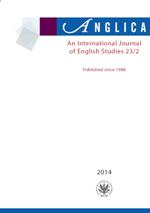Non-root-initial ictus on native words in Old and Middle English poetry
Non-root-initial ictus on native words in Old and Middle English poetry
Author(s): Marta KołosSubject(s): Language and Literature Studies
Published by: Wydawnictwa Uniwersytetu Warszawskiego
Keywords: Middle English; stress; prosody; syllable-weight; diachrony
Summary/Abstract: Primary word-stress in Germanic languages is generally defined as root-initial. This placement is considered decisive in the metrical shape of native poetic creations, with a tendency for placing prominence where linguistically plausible. However, notable exceptions can be traced in Middle English poetry, with ictus in certain native words falling on a derivative suffix or the second element of an obscure compound rather than the root. The present paper discusses possible reasons for the divergences on the basis of a sample of major poetic works. Focus is placed on the diachronic development from Old to Middle English. Firstly, a discussion from the point of view of linguistic prosody is included, with attention devoted to the possibility of non-weak stress in Old English falling on all heavy, bimoraic syllables. Secondly, semantic aspects are analysed, with focus on the possible impact of incomplete grammaticalization of certain morphemes. Finally, French influences are noted.
Journal: ANGLICA - An International Journal of English Studies
- Issue Year: 23/2014
- Issue No: 2
- Page Range: 33-41
- Page Count: 9
- Language: English

